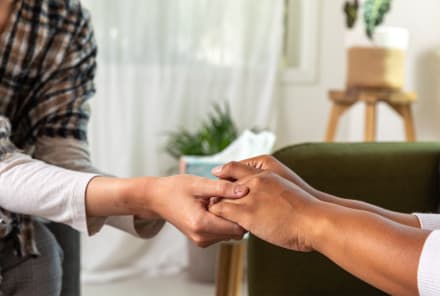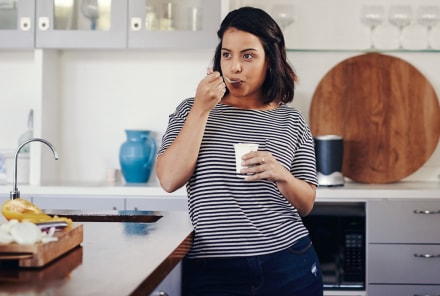Advertisement
10 Science-Backed Tips For A Better Sex Life (That Don't Include The Bedroom)


Let us start by saying: The concept of a "good" sex life is completely subjective. Sexual satisfaction looks different for every couple, so there isn't one right answer—it's important to discover what you personally need to be sexually fulfilled.
Now, having said all this, researchers have identified some common patterns between couples who self-report great sex lives. Specifically, psychologists John Gottman, Ph.D., and Julie Gottman, Ph.D., founders of the Gottman Institute, highlight a study surveying 70,000 people in 24 countries (detailed in the book The Normal Bar).
The results? "The people who reportedly had a great sex life did things that were really different from the people who had an awful sex life," John says on the mindbodygreen podcast. "And none of those things involve what you do in the bedroom."
10 tips to have a better sex life (that don't include the bedroom).
With respect to the aforementioned study, the Gottmans recount 10 main differences between couples who reported a great sex life and those who didn't. Couples with a better sex life do these simple things:
Say "I love you" at least once a day.
...and really mean it! Take your time expressing those emotions: Instead of rushing your "love yous" (perhaps haphazardly before hanging up a phone call), try to bring meaning back to the phrase.
Kiss your partner passionately and often, for no reason at all.
Kissing has a plethora of health benefits, and it releases feel-good hormones like oxytocin and dopamine. By kissing your partner often (not just during sex), you can enhance intimacy between the two of you and even increase arousal. Make that extra effort to keep the flame of your love burning—there's nothing that sparks a flame like a spontaneous smooch.
Cuddle together.
The Gottmans found that cuddling is strongly correlated with sex life. In fact, "96% of the non-cuddlers said they had a bad sex life," John says regarding the study. No matter what time of day you're cuddling (to fall asleep, to watch TV, etc.), this intimate touch releases the hormone oxytocin from your brain's pituitary gland; and this "love hormone" can then further the bond in your relationship.
Show your affection.
We're not saying you absolutely should smooch your loved one in public settings. Some people aren't partial to PDA—that's OK! The Gottmans suggest finding your own way to show your affection, even if it's as simple as holding their hand on a midday stroll. Do what makes you feel most comfortable, but don't be afraid to express your love beyond closed doors!
Have a romantic date at least once a week.
A romantic date doesn't need to entail a white tablecloth, candles, and a lofty bill at the end of your meal. You define romance in your own relationship: A romantic date could be as simple as cooking a homemade meal together, watching a classic movie, creating a vision board together—get creative.
Take romantic vacations.
Not everyone can pick up and head to the beach, but the Gottmans do suggest carving time and space for some sort of romantic getaway—a small change in scenery if you can. Putting your relationship in a new environment can create a new space for your romance to grow, and exploring adventures with your partner can strengthen your connection (more on that later).
Give compliments.
Even the smallest of compliments can be meaningful to your partner, especially if their love language is words of affirmation. Tiny observations like, "I really appreciate you coming to my work event," can help your partner recognize the impact of their actions while simultaneously boosting their confidence.
Give surprise gifts.
And for those whose love language is gifts, surprise presents can symbolize appreciation for your partner, especially ones that are clearly meaningful, personalized, or seemed to take a effort. Again, you don't need to shell out cash for a surprise gift—even just snagging them a new shampoo bottle when theirs runs empty can show that you listen and you care.
Stay good friends.
Sure, you may love your partner, but it's important to make sure you like them, too (yes, they're different). See, at the core of every healthy friendship is a strong emotional connection; that's why you may often hear couples say that they're best friends. Perhaps do activities your partner loves to help strengthen the friendship in your relationship, or see here for all the ways you can become a better friend.
Have an adventure together.
Face your fears together! This will not only help you grow but also will build trust in your partner. In fact, research shows that feeling exhilarated with your partner (like when you tiptoe out of your comfort zone) can increase arousal1. The adventure can be as simple as exploring a new hobby together or even watching a suspenseful movie to create that frightened-but-sort-of-excited response. Make some memories and push each other out of your comfort zones...together!
The takeaway.
Keep in mind that everyone has different desires; not every couple finds their sex life very important, and sexual frequency is not an indicator of satisfaction. However, the Gottmans emphasize that it doesn't take much for things to go well in the bedroom—by keeping the fun, adventure, and affection alive, your sex life is likely on the path to success. "It doesn't take a lot to have things go great in the bedroom," John adds. "And what you do in the bedroom is your business."











